#pompey and the pirates
Explore tagged Tumblr posts
Note
do u have any comics about that one time julius demanded his own ransom be higher
alas, I do not
#i'd have to finish reading a book on ancient mediterranean piracy and also draw some kind of. ship.#i'll draw pirate ships for treasure island but the idea of drawing roman pirates outside of whatever sextus pompey has#going on is like. eughh. boats. ehghhhhh. for caesar? eghghhh.#that said i'll probably do it for caligula someday because his boat thing is so over the top that it's extremely funny to me#ask tag
22 notes
·
View notes
Text
People who act like it's unrealistic when two characters in a novel discover they're related clearly aren't aware of how Caesar Augustus ended up proscribing his future wife and heir and he owes their not being dead to his nemesis who was making Sicily a safe haven for the proscribed and offering double the monetary reward for any living proscribed people that the Triumvirs were offering for one dead
#Sextus Pompey#Sextus Pompeius#sicily#caesar augustus#livia drusilla#tiberius#yes i will use anything as a pretext to tell people how awesome sextus Pompeius was#sextus#sextus can sext us#pirate king#ancient pirates#the piracy thing was mainly augustan propaganda but it just makes sextus more dashing so jokes on Octavian
14 notes
·
View notes
Text
'I am no king, but Caesar'

Gaius Julius Caesar was born on July 12, 100 BC in the Suburra, a populous neighborhood of Rome, to a patrician family although in economic decline. In Gens Iulia, those who had the surname Caesar descended, according to the account of Pliny the Elder, from a man who was born after a Caesarean section (from the Latin verb "to cut", caedo, -ĕre, caesus sum). He was born in a Republic in crisis and the aristocracy divided into two warring factions: The optimates and populares. He lost his father when he was about 14 years old; he was greatly influenced by his maternal uncle Gaius Marius. Caesar had an older sister, Julia Major, and a younger sister Julia Minor (maternal grandmother of Emperor Augustus). His uncle, Gaius Marius, was the leader of the Populares ("supporters of the people") and rival of Lucius Cornelius Sulla, leader of the Optimates ( "best ones")

In 84 BC Lucius Cornelius Cinna, an ally of Gaius Marius, chose the 16 year old Caesar to be flamen Dialis (priest of Jupiter) and married him to his 13 year old daughter Cornelia with whom Caesar had a daughter named Julia. It is not certain whether the girl was born a few months before or after the teen Caesar had fled Rome or, more likely according to historians, she was born when he returned years later and was reunited with his wife.
Following the suicide of Gaius Marius in 86 BC, Cinna, one of the leaders of the Populares, became sole ruler of Rome and most of the provinces while persecuting Sulla's followers. In 84 Cinna was assassinated and populares defeated.
Due of his ties to the Cinna family, Sulla attempted to force Caesar to divorce Cornelia if he wanted to live in peace, but Caesar refused. Sulla confiscated his property, and he was forced to leave Rome. Populares supporters and Caesar's own mother pressured Sulla to allow him to return, claiming that he was not dangerous as he was just an adolescent. Sulla refused and said "I see several Marius in him" referring to his archrival Gaius Marius, Caesar's uncle.
Shortly afterwards, although he was allowed to return to Rome, Caesar decided to head to Asia to participate in the war against Mithridates VI of Pontus. There he distinguished himself in the capture of Mytilene. He then headed to Bithynia, a kingdom allied to Rome, where he spent some time.

In addition to being a politician and a soldier, Julius Caesar was a writer. Among others, his works were a treatise on astronomy, another on Roman religion, a study on Latin and his comments on the war in Gaul and the Civil War; only his writings on those two wars have not been lost.
In the year 78 after Sulla's death from natural causes, Caesar decided finally to return to Rome. He was reunited with his wife Cornelia, who had waited patiently for him. Nine years later, Cornelia- the only woman he truly loved, according to all accounts- died at the age of 28. Caesar went into deep mourning and gave a solemn speech.

After serving as quaestor in the Hispania Ulterior province where he increased his network of clients - patronage was key to success in Roman politics - Caesar returned to Rome in 69 BC where he served as Aedile; he carried out building programs and offered the largest gladiatorial games seen until then. This left him almost bankrupt. In 60 BC he decided to make a private agreement with the prestigious general Pompey the Great and one of the richest man, Marcus Licinius Crassus. Pompey had just put an end to the pirate problem and years earlier, together with Crassus, he had defeated the slave rebellion led by Spartacus.
Pompey and Crassus were hampered in many of their ambitions by the Optimates in the Senate. Caesar, knowing this, approached them to put together an unofficial coalition - known to history as the Triumvirate - if they made him Consul, he would see to it that laws were passed that would benefit them. To further consolidate this alliance, in the year 59 BC Caesar married Pompey to Julia. Although this was a typical political marriage, classical sources state that Julia truly loved Pompey and he loved her.
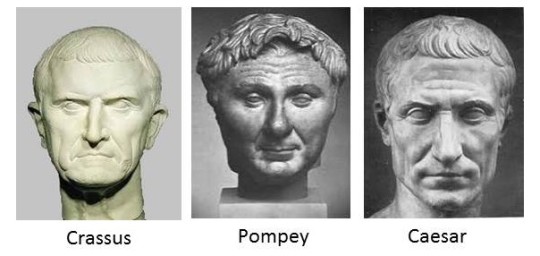
Pompey and Crassus decided to ally themselves with Caesar and the populares in order to gain more offices and wealth. In this way, the three took full control of Rome. In 59 Caesar was appointed consul.
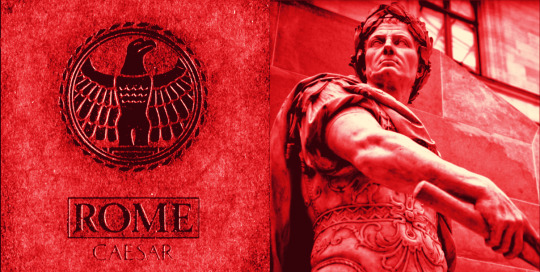
Laws were passed granting the province of Syria to Crassus. Laws were passed distributing lands among Pompey's veterans. And at his own request, the Gallic provinces-both the pacified and the "wild" ones- were handed over to Caesar. Cicero, a true defender of the Republic, was exiled due his bold speeches against the Triumvirate, which he called a "three-headed monster" but was allowed to return the following year. The passage of the laws favoring the triumvirs was ensured by introducing veteran legionaries of Pompey into the meetings of the Senate.
Also in 59 BC Caesar established a military camp in the Arno valley, on the Via Cassi, the main communication route between Rome and the north of the country. He called the camp Florentia, which means "flowering." The camp quickly became an important commercial town. Today it is the beautiful Italian city Florence.

In Gaul with his legions, he defeated and subdued several peoples in just a few years. Caesar wrote in detail about this conquest in his Bellum Gallicum (Gallic War). Believing that everything was under control, he headed to the mysterious land that the Romans called Britannia and where they believed the world ended. The Gallic War was between 58-52 BC

Caesar finally arrived in Britain for the first time in the summer of 55 landing with two legions. The following year he arrived with 800 ships, five legions and 2,000 cavalry. Caesar's comments on this war constitute the first written descriptions of the people, culture and geography of the island.

Although Caesar not conquered Britania (it was conquered under the Emperor Claudius) this campaign it established Rome's first allied peoples in Britain.
While in Britania, Caesar received the news that his daughter and the baby she was expecting had died in childbirth.
At the same time he had no idea that a genuine leader named Vercingetorix, of the Arverni tribe, had managed to unite all the Gallic peoples under his authority, determined to expel the Romans

Caesar himself called him "King of all the Gauls"
The most famous and final battle was that of Alesia. Although Vercingetorix was a great warrior, he could do nothing against the genius (sometimes bordering on madness) of Caesar and his legionaries. According to Caesar, Vercingetorix, seeing that if he continued he would starve his entire people to death due to the siege, rode towards the Roman camp, dismounted, took off his sword and sat on the ground without saying a word. He decided to surrender in exchange for his people living. And so it happened, Vercingetorix was taken prisoner but his men were not executed. But Caesar had to wait years for his triumph -and Vercingetorix had to wait as a prisoner in Rome, before his execution- because while Caesar was fighting against the Gauls, many Roman senators were plotting his downfall.

Everything Caesar wrote about his battles and conquests, written in the third person, was copied and sent to be read publicly in Rome, which was celebrated by the plebs and Caesar 's supporters. True republicans such as Cato, Cicero, Cassius, and Brutus perceived a real danger to the Republic. The Triumvir Crassus was killed by Parthians in his failed attempt to conquer Parthia: The triumvirate was over and Pompey, who had become Sole Consul saw in Caesar a dangerous rival, and allied himself with the Optimates again.
They created a new law: the office of consul or proconsul could no longer be held in absentia, as well as running for those offices outside of Rome. Thus, Caesar, far from Rome, lost the protection of the law that granted him his magistracy—just as today, the President of a nation cannot be prosecuted while in office—and could no longer run for election as consul or proconsul. Clearly, the idea was to put him on trial and send him, hopefully, into exile, since thanks to this law, he instantly became an ordinary citizen.
Upon receiving this news, Caesar was enraged and decided to return to Rome not as a citizen, but as a general commanding his legionaries, who followed him devotedly. He would later say, "I never wanted this war, but my adversaries have eagerly sought it."
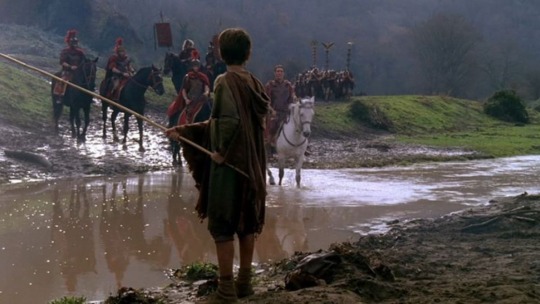
No legion was to reach Rome by crossing the Rubicon River; such an action meant civil war.. Caesar crossed the Rubicon with his XIII legion and proclaimed a very popular phrase in Ancient Rome that players always said before throwing the dice: "Alea Iacta Est" (the die is cast). This is known thanks to Roman historians who took as a source the writings of Gaius Asinius Pollio, who was close to Caesar and could have heard him. This saying became legendary even for the ancient Romans due to the surprising idea of using this phrase from a game in the context of a war.
Pompey and his legionaries left Rome and prepared for the war in Greece. In September of 48 Pompey was defeated at the Battle of Pharsalus. But he did not give up and headed to Egypt to seek the support of the young king Ptolemy XIII. Egypt was then a vassal kingdom of Rome due to its years of indebtedness, and the creditor was precisely Pompey, who had lent huge sums to Ptolemy XII. But as soon as he landed in Egypt, he was met by a group of men who, in the name of the young king, beheaded him and took his ring.
Fun fact: Among those who fought alongside Pompey against Caesar was the centurion Titus Flavius Petro, who after the defeat at Pharsalus was pardoned by Caesar and returned home; he was the grandfather of Titus Flavius Vespasian, the emperor who replaced the Julio-Claudian dynasty with his own Flavian dynasty in 69 AD.
While Cato the Younger and his men went to the province of Africa to continue the resistance, and Pompey's sons did the same in Hispania. Caesar went looking for Pompey to try to come to an agreement.
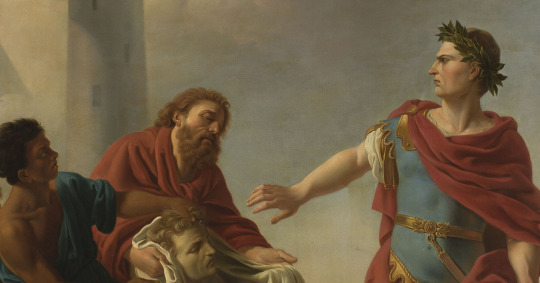
'Julius Caesar’s Dismay Upon Seeing The Head Of Pompey' (detail) By Louis-Jean-François Lagrenée (18th century)
King Ptolemy XIII, who was engaged in his own war with his sister Cleopatra for the throne, thought that by killing Pompey and giving his head and ring as a gift he would earn Caesar's gratitude and thus his kingdom would settle the unpayable debt it owed Rome. But Caesar was enraged by the undignified manner in which a Roman general and consul had been murdered and decided to side with Cleopatra and her allies.
The meeting between Cleopatra VII and Caesar at night and she entered hidden inside a huge rolled-up carpet carried by his slaves. Cleopatra was one of the many lovers that he had, they lived together and had a son, nicknamed Caesarion (little Caesar) whom he recognized but not legally. While Republican forces continued to resist, Caesar was immersed in the war between Ptolemy XIII, Cleopatra and the other sister, Arsinoe IV. Caesar's troops, together with those of Cleopatra plus Caesar's allies such as Mithridates of Pergamon and his army and a Jewish armed force led by Antipater finally won that war in January 47 and Cleopatra kept the throne of Egypt.
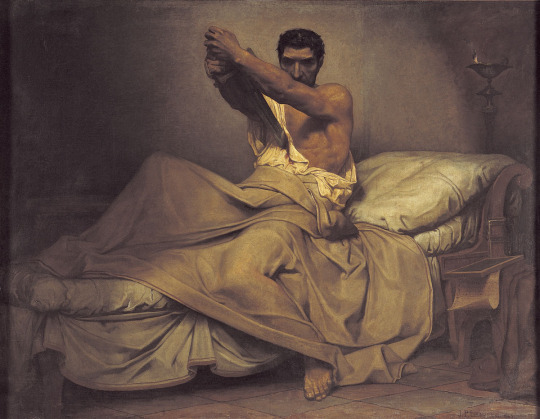
The Death of Cato of Utica, By Jean-Paul Laurens.
In early 46 BC, Caesar defeated the army of Cato the Younger, also known as Cato of Utica . Cato did not take part in the battle and being in Utica, Africa, after receiving the news that Caesar had won and pardoned his adversaries, decided to take his own life at the age of 49. Cato had a republican soul but was stubborn man, and was convinced that Caesar wanted to be king. He was the half-brother of Brutus's mother, Servilla (Caesar's long-time lover).
It was in this same year that Caesar, with the advice of the astronomer Sosigenes of Alexandria, reformed the calendar, leaving each month with the same number of days as it has today and creating the leap year.
The final battle of Munda, in Hispania, was on March 17, 45 BC, thus ending the civil war. Caesar returned to Rome and an intimidated Senate legitimized his victory by appointing him dictator for a ten-year term.
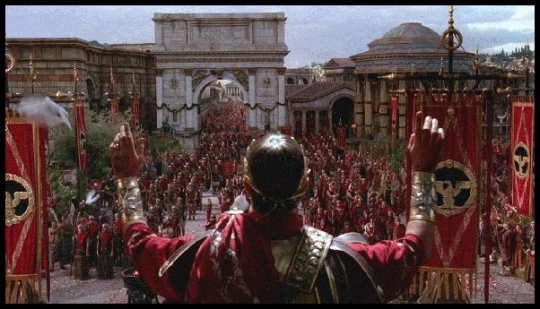
The position of Dictator was created by the Republic itself; he was a magistrate, elected by the Senate, with absolute powers to resolve military emergencies or exceptional tasks for a period of six months. He had to leave after that period or before if he managed to resolve the problem. This 10-year dictatorship was unprecedented.
In February 44 BC, Caesar succeeded in having the people of Rome proclaim him dictator for life. Cicero resigned from political life in protest.
Cassius persuaded Brutus that the only way to save the Republic was to kill Caesar. They needed Brutus to lead the conspiracy because of his prestige; he was not only Cato's nephew but also the direct descendant of the Republic's founding father.
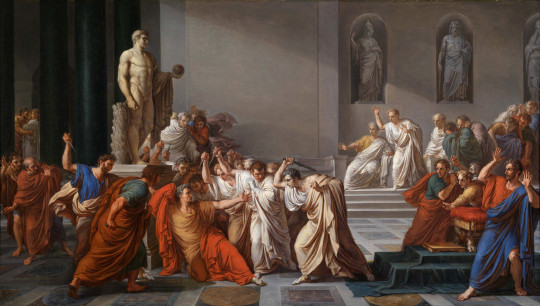
The Death of Caesar. By Vincenzo Camuccini (1805)
On 15 March 44 BC the group of conspirators intercepted Caesar just as he was passing the Theatre of Pompey, where the Roman Curia was meeting, and led him into a room off the portico. Lucius Tillius Cimber, under the pretext of presenting a petition, grabbed Caesar's toga with both hands and pulled him so tha Publius Servilius Casca could stab him, causing Caesar to exclaim "Ista quidem vis est?" ("What kind of violence is this?") Casca, drawing a dagger, slashed him across the neck. "What are you doing, Casca, you villain?" were perhaps his last words.
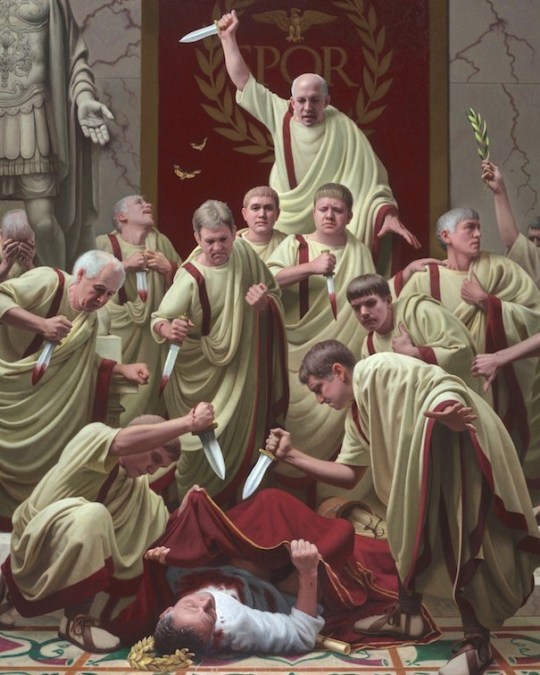
According to classical sources, he tried to flee but slipped on his own blood. A Roman coroner stated that "Caesar's body had several cuts, and 23 stab wounds but only one of them, in the chest, was fatal." They also claim that as he lay dying he took his toga and covered his face so that no one would see him die. He was 55 years old.

Mark Antony with other colleagues carefully collected the body and carried it before the people. Then he made a memorable speech.
The month then called Quintilis, the month of Caesar's birth, was renamed Iulius (July) in his honour on the initiative of Mark Antony. Julius Caesar was the last dictator of Rome; the office was abolished after his death.
Caesar named his grandnephew Gaius Octavius Thurinus as sole heir and adopted son, taking the name Gaius Julius Caesar Octavianus. As was customary in this type of adoption, he had the name of his maternal relative and since then he legally belonged to the family clan, in this case the Julii, adding to his new name the original paternal lineage: Octavianus ( "of the Octavii").
A good example to understand this is the father of Empress Livia, who was born with the name Appius Claudius Pulcher and who, upon being adopted by his maternal uncle Marcus Livius Drusus, changed his name to Marcus Livius Drusus Claudianus.
But nowhere in Caesar will did he say that his nephew should be his successor in office. It was very common among Roman aristocrats without sons to adopt a nephew, son of a sister or niece, or a grandson through a daughter if the father had already died, to continue the surname or clan name (nomen gentile).
If he legally recognized Caesarion, the boy would become a Roman citizen, and it would be a serious problem if the king of Egypt were Roman, as he could claim a throne in Rome. This shows that Caesar did not intend to establish a monarchy and was genuinely concerned about his fatherland.
Octavius certainly benefited from the adoption, but he became the Emperor of Rome thanks to his iron will, extraordinary cunning and political skill.
After his death, Caesar was proclaimed Divus Iulius, or the Divine Julius. He was the first Roman ruler to be deified.
After the end of the Julio-Claudian Dynasty, the cognomen CAESAR would become a Title of the Imperial Power, even many centuries later translated into other languages, such as the German Kaiser or the Russian Tsar.

In front of the theatre, an altar was erected where the pyre was placed so that Julius Caesar's body could be cremated in great mourning. Part of this altar is still preserved in the ruins; more than two thousand years after the assassination, every 15th of March, people come to leave flowers there.

Photo by Giovanni Dall'Orto, taken on March 15, 2008 Attribution, via Wikimedia Commons
192 notes
·
View notes
Text
as a reminder, a bunch of the tmagp leads have been in other rq productions already, so if you like what you're hearing and want more of them, voices you have already heard include:
shahan hamza (sam): plays sivapathasundaram in trice forgotten, a plucky young cartographer on the run from the british after escaping execution for a crime he didn't commit. anxious and insecure with a tendency to run his mouth at all times, siva either instantly charms or makes enemies of everyone he meets.
sarah lambie (lena): plays octavia in cry havoc, sister to the triumvir gaius octavius. a bit of a champagne socialist who expresses her frustration at the roman political sphere through writing plays, octavia is trying to reconcile her position of vulnerability as a woman with her position of privilege as a noble, mayhaps finding love with an actress in her company along the way 👀
ryan hopevere-anderson (colin): plays sextus pompey in cry havoc, notorious pirate with a notoriously good ass. he's dangerous, he's sexy, he gives good relationship advice, he's here to kidnap the triumvirate's nearest and dearest for a hefty ransom.
kazeem tosin amore (teddy): plays mark antony in cry havoc, triumvir of rome who "doesn't do numbers" because "there's millions of them." he loves rome and he loves his wife, but he trained for the battlefield, not admin, and would rather do almost anything than have a conversation about negotiating supplies of grain. he's brash and impulsive, but a hard backbone runs through him, and there are certain moral lines he cannot ever bring himself to cross, even when he wants to.
190 notes
·
View notes
Text


MY FRIEND MADE ME ONE OF POMPEYS ELEFENTS
yall what should i name him vote
13 notes
·
View notes
Text
alright antony and cleopatra let’s get it
part ONE! (which is just until wherever the intermission break is)
-choreographed prologue??? 👀
-TECHNO PROLOGUE!!! low key this is such a vibe
-“my boss is a manwhore”
-just let them have bed wrestling fights!
-ANTONY BYRNE??? DUKE VINCENTIO ANTONY BYRNE??? yaaaaaaaaaay
-i love them both already
-seriously they are such an amazing vibe
-the way he covers his face with a pillow when she teases him for blushing omg
-they are just so utterly besotted and it’s making me so happy
-ooh boy we have another soothsayer
-this has the same energy as the carmen card trio
-wait i feel like this actor playing one of the ladies in waiting was in troilus and cressida (edit: yes! it’s amber james! aka cressida and now charmian!)
-cleopatra fully just said “i’m out i’m not talking to him right now” lol
-well that just happened (fulvia is dead!)
-somebody give antony a hug pls
-enobarbus what are you doing
-“I CAN’T DO THE HONEYMOON PHASE ANYMORE”
-she is just so. utterly. brilliant. and. so. MUCH. and i love it
-“eternity was in our lips and eyes”
-oh wait this is the scene from this play they did at [area shakespeare company’s] founder’s retirement party
-their energy is so much and i love it
-“Sir, you and I must part, but that’s not it/Sir, you and I have loved, but there’s not it…”
-soundtrack continues to pop off
-octavius: insecure about masculinity
-octavius wants to cancel antony and lepidus isn’t so sure
-YAAAAAAAY PIRATES OF PLOT CONVENIENCE! (okay maybe just plot spice but whatever)
-okay we fully just skipped a scene i guess (from the few lines i skimmed it looks like “cleopatra and her girls do edibles”)
-okay so pompey is collaborating with Pirates Of Plot Spice TM?
-“okay so how do we get the boys to start fightingggggg”
-okay we’re jumping back to cleopatra and her girls doing edibles
-love the music and love the mardian dude
-“where’s my serpent of old Nile?…now i feed myself with most delicious poison” so uh. about that.
-‘you’re not mark antony’ lolol
-not sad or merry but a secret third thing
-‘charmian that was LAST play’
-the boys are fightingggggggg
-‘i didn’t say i wouldn’t, i just didn’t do it’ mood
-“That truth should be silent I had almost forgot.” OOOOOOOOH
-oh this is definitely a great idea /s
-oh hey it’s the barge speech!
-he’s just a boy who cain’t say no!
-“Age cannot wither her, nor custom stale/Her infinite variety.”
-sleepover at agrippa’s!
-LUCY PHELPS OCTAVIA??? (so the duke and isabella did get married in an alternate universe then)
-“i will definitely, 100%, not cheat on you” yeah it’s act two i’m not putting it past you
-no one ever listens to the soothsayer
-FUCKIN CALLED IT
-“Give me some music—music, moody food/Of us that trade in love.” 🤝 “if music be the food of love, play on”
-y’know, iras is so Not Even In This Play
-she is a QUEEN
-“But sirrah, mark, we use/To say the dead are well.” ross over in scotland, about to tell macduff his family is dead: *shuffles uncomfortably*
-i love their banter
-“you did NOT just say octavia was better at banging than me”
-oh she’s straight up beating him up
-“PLEASE DON’T SHOOT THE MESSENGER”
-she is Going Through It
-pompey: *gives very emotional speech*
octavius: …take your time
lmao
-BOAT PARTY
-so enobarbus and menas are besties anyway? i thought they were on opposite sides (which obvs does not prevent bestie relationships but yeah)
-enobarbus knows what’s up
-BOOOOOOOOAAAAAAAAT PAAAAAAAARTY
-yeah lepidus words are hard
-menas has a Plan
-octavius: buddy i am Not Getting Drunk Tonight
-PLAY THIS IN THE CLUB
-Many Complicated Emotions Between These Two,
-antony, fully intending to ditch octavia at first opportunity: well this is awkward
-messenger: i can’t fucking believe i still have to work this customer service job even after getting beat up
-scoping out the competition
-uh oh. there are Political Problems
-GO OFF OCTAVIA (also this is just like blanche in king john)
-“The Jove of power make me, most weak, most weak, your reconciler. Wars ’twixt you twain would be As if the world should cleave, and that slain men should solder up the rift.”
-oh octavius is Big Mad
-“YOUR HUSBAND IS CHEATING ON YOU OCTAVIA” “NO I JUST WANT YOU GUYS TO STOP FUCKING FIGHTING”
-ooh did octavia just take her ring off 👀
and that’s intermission! this is GREAT and i would continue watching but it is also late and i am tired so…rest tomorrow!
#antony and cleopatra#this is such a vibe i’m having a blast#completing the canon#theatre#theater#plays#shakespeare#william shakespeare#why didn’t y’all tell me this play is FUN
10 notes
·
View notes
Text
No vanilla extract. No garum. You cannot get more sticks, or break the one in half.
#poll#ancient history#ancient rome#roman empire#shakespeare#julius caesar#asterix and obelix#ides of march
15 notes
·
View notes
Text


this bit in appian v this bit in the res gestae......the rg 'pirates' being sextus pompey......hhggrggggghh
6 notes
·
View notes
Text

it's so nearly NEARLY finished. Battlemap for my upcoming DND campaign the Ptolemy! Commissioned by the Elodian fleet admiral Pompey to free the Finneatian sea of pirates! It's a swashbuckling naval themed adventure and I can't wait to tell y'all about it! ^w^
this has taken way too long cause life has been a MESS lmao.
4 notes
·
View notes
Text
Pompey the Great assassinated, September 28th, 48 BC
Upon landing in Egypt, Roman general and politician Pompey is murdered on the orders of King Ptolemy of Egypt.
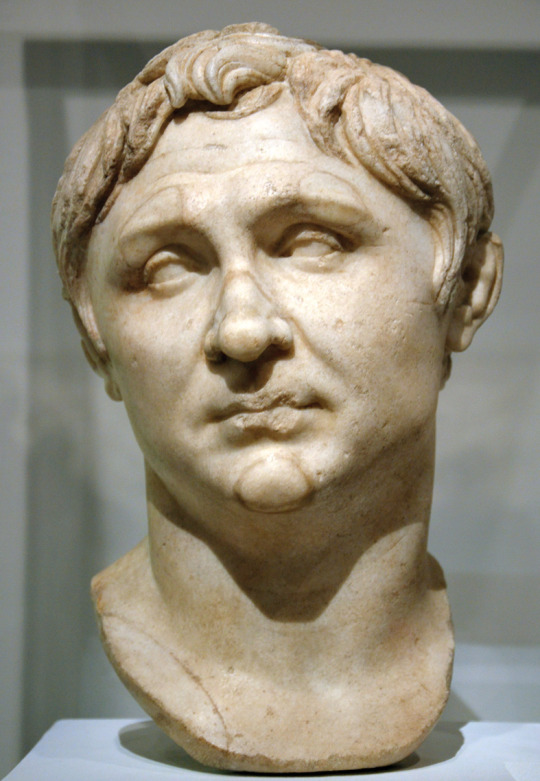
During his long career, Pompey the Great displayed exceptional military talents on the battlefield. He fought in Africa and Spain, quelled the slave revolt of Spartacus, cleared the Mediterranean of pirates, and conquered Armenia, Syria and Palestine. Appointed to organize the newly won Roman territories in the East, he proved a brilliant administrator.
In 60 B.C., he joined with his rivals Julius Caesar and Marcus Licinius Crassus to form the First Triumvirate, and together the trio ruled Rome for seven years. Caesar’s successes aroused Pompey’s jealousy, however, leading to the collapse of the political alliance in 53 B.C. The Roman Senate supported Pompey and asked Caesar to give up his army, which he refused to do. In January 49 B.C., Caesar led his legions across the Rubicon River from Cisalpine Gaul to Italy, thus declaring war against Pompey and his forces.
Caesar made early gains in the subsequent civil war, defeating Pompey’s army in Italy and Spain, but he was later forced into retreat in Greece. In August 48 B.C., with Pompey in pursuit, Caesar paused near Pharsalus, setting up camp at a strategic location. When Pompey’s senatorial forces fell upon Caesar’s smaller army, they were entirely routed, and Pompey fled to Egypt.
Pompey hoped that King Ptolemy, his former client, would assist him, but the Egyptian king feared offending the victorious Caesar. On September 28, Pompey was invited to leave his ships and come ashore at Pelusium. As he prepared to step onto Egyptian soil, he was treacherously struck down and killed by an officer of Ptolemy.
#pompey#pompey magnus#gnaeus pompeius magnus#first triumvirate#ptolemaic egypt#rome#ancient rome#roman republic#roman history#roman empire#julius caesar#gaius julius caesar#pompey the great#history#ancient history
23 notes
·
View notes
Text
Pompey and the Pirates is my new cover band.
5 notes
·
View notes
Text
History of the Holy Grail: highlights so far
-The framing device in chapter one with the priest narrator. I love this dude.
-Evalach/Mordrain's secret sex doll
-Pompey and the Pirates taking up an entire chapter out of nowhere. It's Victor Hugo levels of unnecessary backstory and it's amazing.
-The Turning Isle aka Medieval Physics 101
-Adam and Eve being so so sad that they have to have Carnal Relations (because sex = sin) and God graciously providing a Modesty Cloud (tm) so at least they don't have to look at each other whilst having Sad Carnal Relations
-Okay the number of Unnecessary Backstory Detours is actually getting quite impressive. Most of them are more interesting than the main story too
-The repeated warnings about Women, who are So Sneaky and Clever that no man can hope to outwit them, so Watch Out Guys
-Hercules and Samson were related, obviously, since they were both Strong. This tidbit has absolutely nothing to do with the rest of the story, it's just there.
5 notes
·
View notes
Text
finally writing about that hot little pirate, sextus pompey
10 notes
·
View notes
Text
Grèce : Les maisons anti-pirates de l’île d’Ikaria.



Les pirates, aussi vieux que la marine, ont été un terrible fléau en Méditerranée depuis l’Antiquité, puisque le grand Pompée fut chargé de mener une expédition pour les exterminer. Ils ont particulièrement sévi dans les nombreuse îles grecques qui leur servaient de refuge. Ikaria a été leur victime à plusieurs époques, l’îlot voisin de Phourni constituant une base de raids idéale. Les habitants cessaient alors de vivre sur les côtes et se réfugiaient dans les montagnes où la géologie les protégeait, on trouve souvent de grands blocs de pierre plus ou moins plats formant un toit naturel qu’il suffisait de fermer par un ou deux murs. Visibles seulement de tout près, ils ont permis aux Ikariotes de disparaître littéralement pendant tout le XVIIe siècle, au point que l’île semblait inhabitée. Pour éviter d’attirer l’attention, les maisons n’avaient généralement qu’un seul niveau, plus bas que le rocher ou la falaise qui la camouflait et elles n’avaient pas de cheminée, pour éviter les colonnes de fumée. Les habitants interagissaient principalement la nuit et évitaient d’utiliser le feu ou toute source de lumière, et ils ne gardaient même pas de chiens, de peur que leurs aboiements n’attirent des invités indésirables. Quand par hasard des pirates parvenaient jusqu’à ces refuges, les habitants, prévenus par un système de guetteurs, avaient disparu. Les brigands ne trouvaient chez ces gens très pauvres, que quelques hardes ou objets sans valeur et en étaient pour leurs frais. Fait intéressant, malgré les difficultés endurées par les habitants au cours des siècles, Ikaria est connue comme la terre de la longévité en Grèce, où une personne sur trois finit par vivre jusqu’à 90 ans et beaucoup deviennent centenaires. Greece: The anti-pirate houses on the island of Ikaria. Pirates, who are as old as the sea, have been a terrible scourge in the Mediterranean since Antiquity, when the great Pompey was commissioned to lead an expedition to exterminate them. They were particularly rampant on the many Greek islands that served as their refuge. Ikaria has been their victim at various times, with the neighbouring islet of Phourni providing an ideal base for raids. The inhabitants stopped living on the coast and took refuge in the mountains, where the geology protected them: large, more or less flat blocks of stone are often found, forming a natural roof that could be closed off with one or two walls. Only visible up close, they allowed the Ikariotes to literally disappear throughout the 17th century, to the point where the island seemed uninhabited. To avoid attracting attention, the houses were generally only one storey high, lower than the rock or cliff that camouflaged them, and had no chimneys to avoid smoke columns. The inhabitants interacted mainly at night and avoided using fire or any source of light, and they didn't even keep dogs, for fear that their barking would attract unwanted guests. When by chance pirates reached these refuges, the inhabitants, warned by a system of lookouts, disappeared. The brigands would only find a few items of clothing or worthless objects in the homes of these very poor people, and they would have had their money's worth. Interestingly, despite the hardships endured by the inhabitants over the centuries, Ikaria is known as the land of longevity in Greece, where one in three people ends up living to the age of 90 and many become centenarians. Muriel Marchand
3 notes
·
View notes
Text
So during one of Garak and Bashir's lunch dates, Garak asserts that Shakespeare's Julius Caesar is a "farce" rather than a tragedy. The show plays this as Garak just failing to appreciate the work, but I think he just pitched the greatest Shakespeare adaptation of all time!
Just imagine: instead of opening on Caesar's triumphant return to Rome after defeating the sons of Pompey, we open on a group of pirates dragging a captive with a bag over his head onto their ship. They tie their victim down and roughly pull the bag off his head, revealing a young Julius. Julius Caesar, indignant yet calm: For your own sake, I hope you know with whom you're dealing.
Pirate Captain, smugly: From the looks of it, you're rich. We don't need to know more than that. If your family wants to see you again, they'd best pay our ransom. 20 silver talents!
Julius Caesar, visibly shocked: 20 talents?! That's an absurd amount!
Pirate Captain, almost sing-song: Not one libra less.
Julius Caesar, genuinely offended: I'm worth at least 50 talents! I demand you increase the ransom!
Awkward pause as the pirates react with confusion.
First Mate, whispering to captain: Are we sure they'll want him back?
Smash cut to title.
The rest of the movie follows the play relatively faithfully, but with comedic music and editing.
2 notes
·
View notes
Text
So do y'all wanna see my mental fan cast for the Pompeians as I write my books? Because that's what I feel like sharing tonight

Daddy Pompey aka Gnaeus Pompeius Magnus just with more auburn hued hair because we all know Pompeius has that ginger blond Alexander vibe going but like Lee Pace has the PERFECT chin and mouth to be Pompeius. Go look at Pompey's statues and imagine him as a younger man and you'll see it

Mucia Tertia mother of all three of Pompeius' children and such a force that not only did she raise them mostly by herself while he was at war but when her son is warring with the triumvirate they send her to talk with Sextus. She has the tragedy of outliving her ex-husband and her two sons. (Yes she's ginger too because I know my genetics and gotta keep that ginger blood strong so Pompeia can look just like grandad for plot purposes)

Sextus Pompeius Magnus Pius the sexy pirate king of Sicily. I will admit that this is mainly inspired by Hayden as RotS Anakin having the right color of hair and also the youthfulness. Sextus was stupidly young when he started kicking ass, just like his dad. Unfortunately for world history he lived an even shorter amount of time than his dad and was dead by 32 much like his dad's honorific namesake Alexander the Great

Fatherless by age six I have a whole story in my head that I've invented for Pompeia Magna daughter of Sextus and believe me it's not cheerful because what is in the Roman world. But she does have one true friend and he happens to be someone who is the most ride or die guy in Rome and will one day be the most powerful man in the empire

Tiberius Claudius Nero who has known Pompeia since they were toddlers together on Sicily when her father Sextus gave his parents refuge from Augustus' proscriptions. Yes Tiberius was a hottie. Fight me on this. Plus Cavill fits the Tiberius mould in the sense that everyone sees big hunky warrior but at heart they're just an absolute nerd. How Cavill is about video games would be Tiberius with Homer or something
#roman history#ancient rome#fan cast#roman empire#how often do you think about the roman empire#pompey#pompeius magnus#sextus pompey#tiberius#Tiberius Claudius Nero#mucia tertia#Sextus Pompeius#gnaeus pompeius magnus#Gnaeus Pompey#pompey the great#alexander the great#alexander#ancient history#the roman empire is my roman empire#sextus can sext us#augustus#julius caesar#livia drusilla#livia#Livia augusta#lee pace#judy greer#hayden christensen#henry cavill#Lily James
5 notes
·
View notes